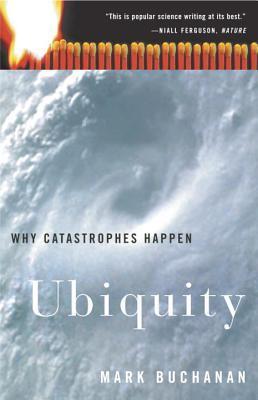
“Critically acclaimed science journalist, Mark Buchanan tells the fascinating story of the discovery that there is a natural structure of instability woven into the fabric of our world, which explains why catastrophes— both natural and human— happen.
Scientists have recently discovered a new law of nature and its footprints are virtually everywhere— in the spread of forest fires, mass extinctions, traffic jams, earthquakes, stock-market fluctuations, the rise and fall of nations, and even trends in fashion, music and art. Wherever we look, the world is modelled on a simple like a steep pile of sand,
Buchanan reveals that we are witnessing the emergence of an extraordinarily powerful new field of science that will help us comprehend the bewildering and unruly rhythms that dominate our lives and may even lead to a true science of the dynamics of human culture and history.” — Book promo @ goodreads.com

A couple of quotes:
The economic power of a nation naturally waxes and wanes. As times change, some nations are left clinging to power that their economic base can no longer support; others find new economic strength, and naturally seek greater influence. The inevitable result? Tension, which grows until something gives way. Usually the stress finds its release through armed conflict, after which the influence of each nation is brought back into rough balance with its true economic strength.
To work out which facts are historical and which aren’t, the historian has to impose himself or herself on them. If a historian sees political influences as being generally predominant over economic forces, then he or she will tend to fish the political facts out of the sea, leaving the others there. Another historian might fish differently. Carr suggested that all historians have bees in their bonnets, and that the reader should beware:
When you read a work of history, always listen out for the buzzing. If you can detect none, either you are tone deaf or your historian is a dull dog. The facts are really not at all like fish on the fishmonger’s slab. They are like fish swimming about in a vast and sometimes inaccessible ocean; and what the historian catches will depend, partly on chance, but mainly on what part of the ocean he chooses to fish in and what tackle he chooses to use—these two factors being, of course, determined by the kind of fish he wants to catch. — E. H. Carr, What Is History?